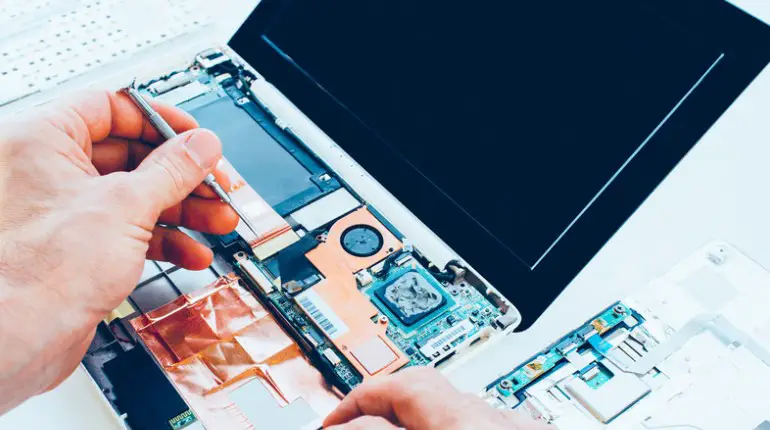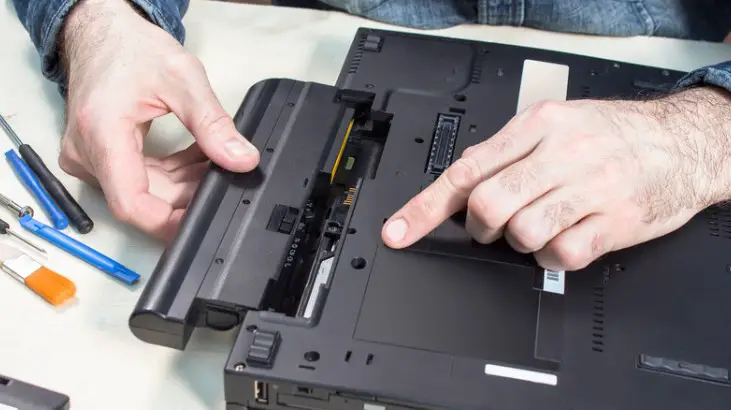The Pros And Cons Of Upgrading Your Laptop Vs. Buying A New One
As technology advances, our devices become outdated quicker than ever before. Laptops are no exception to this phenomenon. They have become an integral part of our lives, and we rely on them for work, entertainment, and communication purposes.
However, when the time comes to upgrade or replace a laptop, it can be challenging to decide which option is best. It’s like being at a crossroads where you must choose between two paths – upgrading your current device or buying a new one.
This article will explore the pros and cons of both options in-depth so that readers can make informed decisions about their laptops’ fate. By understanding the advantages and disadvantages of each path, readers will gain clarity on what suits them better based on their specific needs and budget constraints.
Ultimately, whether they opt for upgrading their existing laptop or purchasing a new one entirely depends on various factors such as cost-effectiveness, performance requirements, durability expectations, and personal preference.
Cost Considerations For Upgrading Vs. Buying New
Cost considerations are a crucial factor when deciding whether to upgrade your laptop or buy a new one. The viability of upgrading depends on the age and condition of your current system, as well as the cost-effectiveness of any potential upgrades. Upgrading older laptops with outdated hardware can be expensive and impractical, ultimately costing more than buying a new machine.
On the other hand, affordability is a major advantage when it comes to purchasing a new laptop. With advancements in technology and increased competition among manufacturers, there are now many affordable options for consumers looking to purchase updated systems at reasonable prices. Additionally, new computers come with warranties that cover repairs and replacements for several years after purchase, providing peace of mind for users.
Ultimately, the decision between upgrading or buying new boils down to individual preferences and budget constraints.
While some people prefer to stick with their tried-and-true machines by upgrading them over time, others may opt for newer models that offer better performance and features. It’s important to weigh all factors before making a decision that fits both your needs and wallet.
Performance Differences Between Upgrading And Buying New
When it comes to comparing the performance differences between upgrading your laptop and buying a new one, there are several factors that should be taken into account.
One of the main concerns when upgrading is compatibility issues. Upgrading individual components such as RAM or hard drive may not necessarily improve overall system performance if they are not compatible with other existing hardware.
However, in some cases, upgrading can result in significant performance gains. For instance, installing an SSD (solid-state drive) instead of a traditional hard disk can greatly increase boot times and application launch. Similarly, adding more RAM can help speed up multitasking capabilities and allow for smoother operation of resource-intensive applications like video editing software.
On the other hand, upgrade limitations must also be considered. Some laptops have limited expansion options due to their compact design, which means upgrades may not even be possible for certain components. Additionally, newer technology that cannot be retrofitted onto older systems may require investing in a new laptop altogether to experience its benefits fully.
In summary, evaluating whether upgrading or buying a new laptop is appropriate depends on various factors such as budget constraints and specific needs. While upgrading allows for cost savings by only replacing necessary parts, this option has its own set of challenges including compatibility issues and upgrade limitations.
Conversely, purchasing a brand-new laptop gives access to new technology features but at a higher price point than just replacing individual components through an upgrade process. Ultimately making an informed decision about what you want from your device will ensure optimal satisfaction with whatever choice is made regarding how best to proceed forward with either approach towards improving computer performance levels over time!
Durability Of Upgraded Vs. New Laptops
According to a survey conducted by Laptop Mag, the average lifespan of a laptop is about 3-5 years. Durability is an important factor when deciding whether to upgrade or buy a new laptop. One may wonder if upgrading their current device will make it last as long as a brand new one.
To compare durability between upgraded and new laptops, we can take into consideration the maintenance requirements for both options. Upgraded laptops require more frequent maintenance due to the potential compatibility issues that come with replacing parts. On the other hand, new laptops have less need for maintenance in the short term but could experience hardware degradation over time.
The table below further illustrates this comparison:
| Maintenance Requirements | New Laptops | Upgraded Laptops |
|---|---|---|
| Frequency | Low | High |
| Cost | Medium | Low-High |
| Compatibility | N/A | Potential Issues |
While upgrading your laptop may seem like the cheaper option at first glance, considering its higher maintenance needs should be taken into account. A new laptop has fewer risks when it comes to compatibility issues and requires less maintenance in general, making it potentially more durable in the long run. Overall, when weighing these factors against each other, purchasing a new laptop may prove more cost-effective than constantly repairing and upgrading an older device without guaranteed longevity.
Customization Options For Upgrading Vs. Buying New
The durability of upgraded laptops versus new ones is a crucial consideration when deciding whether to upgrade or buy a new one. However, customization benefits are also important factors that should not be overlooked.
Upgrading your laptop allows you to personalize it according to your needs and preferences, which can lead to increased productivity and satisfaction. One significant benefit of upgrading over buying a new laptop is the ability to customize its components.
For instance, if you need more storage space for your files or applications, you can replace your hard drive with an SSD (solid-state drive) without having to purchase a whole new device. Similarly, if you require better graphics performance for gaming or video editing purposes, you can install a dedicated GPU (graphics processing unit) instead of investing in a brand-new laptop.
However, compatibility issues may arise when upgrading some components of your laptop. Some parts may not be compatible with each other or with your current system configuration. This could result in reduced functionality or even complete failure of the upgraded component(s). Therefore, it’s essential to research before making any upgrades and ensure that all necessary precautions are taken beforehand.
In summary, while customizing your laptop through upgrades provides several benefits such as personalization and cost-effectiveness compared to purchasing an entirely new device, there may still be potential limitations regarding compatibility issues that must be carefully considered before proceeding with any changes. Ultimately, depending on individual needs and circumstances – either option has its own merits and demerits requiring careful evaluation beforehand.
Compatibility Issues With Upgrading Vs. Buying New
As with any major technology decision, upgrading your laptop or buying a new one can be a daunting task. However, it is important to consider the compatibility challenges and hardware limitations that come with upgrading an older machine.
Imagine trying to fit a square peg into a round hole – while you may be able to force it in, there will likely be some issues along the way. Compatibility challenges are perhaps the most significant drawback of attempting to upgrade an aging laptop.
As newer software and operating systems are released, they often require more advanced hardware components than those found in older machines. This means that even if you are able to upgrade certain aspects of your device, such as increasing RAM or swapping out the hard drive for an SSD, you may still run into problems running the latest programs or applications.
Hardware limitations are another factor to consider when deciding whether to upgrade or buy new. While laptops can certainly last for several years, eventually their internal components simply become outdated and unable to keep up with modern demands.
Even if you are willing to invest in upgrades, there may come a point where doing so simply does not make financial sense – especially if you need a high-performance machine for work or gaming purposes.
Upgrading:
Pros:
- Potentially less expensive upfront cost
- Can extend the life of an existing device
Cons:
- Compatibility challenges
- Limited by hardware capabilities
Buying New:
Pros:
- Access to cutting-edge technology
- No concerns about compatibility or hardware limitations
Cons:
- Higher initial cost
- May not offer significant advantages over upgraded devices
Overall, it is important to carefully weigh your options before making a decision about whether to upgrade your laptop or purchase a new one. While upgrading may seem like an attractive option due to its lower upfront cost, compatibility challenges and hardware limitations should not be overlooked.
Ultimately, investing in a new device may be the best choice if you require high-end performance and advanced features for work or personal use.
Warranty And Support For Upgraded Vs. New Laptops
Compatibility issues are a major concern when deciding whether to upgrade your laptop or buy a new one. However, warranty coverage and technical assistance also play important roles in the decision-making process.
When it comes to warranties, buying a new laptop typically offers more comprehensive coverage than upgrading an existing one. Many manufacturers offer limited warranties for upgraded components, which may not cover all potential problems.
In addition to warranty coverage, technical assistance is another factor that should be considered. Upgrading your laptop often requires advanced technical knowledge and skills that many users do not possess. This can lead to costly mistakes and further complications down the line.
On the other hand, purchasing a new laptop usually includes access to support services from the manufacturer or retailer, which can provide valuable guidance and troubleshooting assistance.
Overall, while upgrading your laptop may seem like a cost-effective solution at first glance, it’s important to consider both warranty coverage and technical assistance before making a final decision. While some upgrades may be relatively simple and straightforward, others can present significant challenges that require professional intervention. Therefore, it’s crucial to weigh these factors carefully in order to make the best choice for your needs and budget.
Environmental Impact Of Upgrading Vs. Buying New
According to a report by the United Nations University, electronic waste or e-waste is expected to reach 52.2 million metric tons in 2021 alone. In this light, it’s essential to consider the environmental impact of upgrading versus buying new laptops.
Upgrading your laptop can help reduce e-waste and lower carbon footprint since you’re not disposing of an entire machine. However, if your laptop has been around for more than five years, replacing individual components may become costly and less eco-friendly.
To better understand the environmental impact of both options, here are three things you should know:
- Manufacturing new electronics requires significant amounts of energy and raw materials like metals and plastics.
- Disposing of old devices often leads to toxic chemicals seeping into landfills or water systems.
- Recycling electronics conserves resources while reducing pollution from manufacturing processes.
Many technology companies today have implemented sustainability initiatives that aim to tackle these issues collectively. For instance, Apple now uses recycled tin, aluminum and rare earth elements in their products. Dell also offers free recycling services globally as part of its commitment towards zero-waste goals.
As responsible consumers, we must weigh our options carefully when considering upgrades or purchasing new gadgets. While upgrades may seem like the best option initially concerning cost and eco-friendliness, sometimes they aren’t practical nor sustainable in the long run.
By supporting technology companies who prioritize sustainability efforts through recycling programs and using renewable materials in production, we contribute positively towards creating a greener planet without sacrificing innovation and convenience.
Time And Effort Required For Upgrading Vs. Buying New
When considering whether to upgrade your laptop or buy a new one, it’s important to evaluate the time and effort required for each option. Upgrading your laptop may seem like an easy fix, but depending on how much you want to upgrade, it could take quite a bit of time and effort. DIY upgrades can be cost-effective, but they require some technical knowledge and skill. Outsourcing the task to a professional can save time and ensure greater effectiveness.
On the other hand, buying a new laptop is often seen as more efficient since everything comes pre-installed and ready to use right out of the box. You don’t have to worry about compatibility issues or spending hours trying to configure settings. However, purchasing a brand new laptop can also come with its own set of challenges. You’ll need to research different models, compare prices, and decide what features are most important for your needs.
Ultimately, deciding between upgrading your laptop vs. buying a new one will depend on several factors such as budget, timeframe, and personal preferences. Some people enjoy taking on DIY projects while others prefer outsourcing tasks that require technical expertise. Similarly, some individuals may prioritize efficiency over effectiveness while others value long-term sustainability over short-term convenience. It’s up to you to weigh these various considerations before making a decision that works best for you in the long run.
| Criteria | Upgrading Your Laptop | Buying a New One |
|---|---|---|
| Time Required | Depends on extent of upgrade; could take several hours or days | Quick process without any additional setup needed |
| Cost Effectiveness | Can be cheaper than buying a new laptop if only minor upgrades are needed | More expensive upfront cost |
| Customization Options | Unlimited options available based on specific needs & preferences | Limited customization options except for higher-end models |
Note: Table created using Markdown format | Durability | Generally less durable due to wear and tear over time | Generally more durable due to higher quality materials and construction |
Future Upgradability Of Upgraded Vs. New Laptops
When considering whether to upgrade your laptop or buy a new one, it is essential to take into account the future upgradability of both options.
One crucial factor to consider is compatibility concerns with upgraded laptops. In some cases, upgrading certain components may not be possible due to incompatibility issues with other hardware parts.
On the other hand, buying a new laptop allows for more future-proofing options. Newer models often have better specifications and features that cater to newer software and applications. Additionally, purchasing a new laptop ensures that all hardware components are compatible with each other, eliminating any potential compatibility concerns.
In conclusion, when deciding between upgrading your laptop or buying a new one, you must weigh the pros and cons of each option carefully. While upgrading an older model may save money initially, it may come with compatibility concerns down the line.
Purchasing a new laptop guarantees future proofing options but comes at a higher cost upfront. Ultimately, finding the best solution depends on individual needs and budget constraints.
Security Considerations For Upgrading Vs. Buying New
Future Upgradability of Upgraded vs. New Laptops
When it comes to upgrading or buying a new laptop, one important consideration is future upgradability. If you plan on keeping your laptop for a few years and want the option to upgrade components such as RAM, storage, or even the processor in the future, then upgrading may be a better choice.
However, if you’re looking for cutting-edge technology and don’t mind replacing your laptop every few years, then buying a new one may be more suitable.
Upgrading your laptop can also have implications for data privacy and software compatibility. When adding new hardware components, there’s always a risk that sensitive information could be compromised in the process. Additionally, upgrades may not always work seamlessly with existing software programs, which could lead to issues down the line.
In terms of security considerations when upgrading versus buying new laptops, it’s essential to keep this in mind: newer models typically come equipped with advanced features designed to protect against cyber threats. On the other hand, older machines are often less secure due to outdated operating systems or firmware.
Ultimately, making an informed decision about whether to upgrade or buy a new laptop requires weighing various factors specific to your needs and preferences.
Security Considerations for Upgrading vs. Buying New
As previously mentioned, upgrading or purchasing new laptops has significant implications when it comes to cybersecurity concerns; thus, taking steps towards protecting personal data should be at the forefront of anyone’s decision-making process.
One aspect that mustn’t go overlooked is ensuring any device remains protected from vulnerabilities originating from unpatched systems’ old software versions – something particularly relevant when considering upgrading devices rather than acquiring brand-new ones. Older machines might have outdated operating systems or firmware, and thus they become more exposed to potential cyber threats.
Data privacy is another significant factor that must be taken into account when upgrading vs. buying new laptops. Upgrading a laptop can expose sensitive data because of the possibility of hardware misconfiguration during installation or accidental damage occurring while replacing components.
In conclusion, both upgrading and buying new laptops have their pros and cons, ranging from future upgradability, cybersecurity concerns, software compatibility issues, among others. It’s essential to evaluate your specific needs before making a decision on whether to upgrade or replace your current device.
However, regardless of what option you choose eventually, it’s vital always to keep in mind best practices for protecting personal data against external threats like malware infections or phishing attacks by employing robust security measures such as firewalls or antivirus software solutions with active protections features enabled at all times.
Brand Loyalty And Reputation
Brand loyalty is a significant factor in the decision-making process when it comes to upgrading or buying a new laptop. Many consumers prefer to stick with brands that have served them well in the past, as they believe these companies offer superior quality and reliability. The advantages of brand loyalty are evident – customers can be confident in their purchase decisions because they know what they’re getting.
Furthermore, brand reputation has an impact on resale value. Consumers who own laptops from reputable brands may find that their devices hold more value than those from lesser-known manufacturers. This is due to consumer trust and confidence in established brands, which translates into higher demand for used products.
In contrast, unknown or untested brands don’t enjoy this level of endorsement and might not command similar prices in the second-hand market. However, while brand loyalty offers many benefits, it’s essential not to overlook other factors such as performance and affordability when considering whether to upgrade or buy a new laptop.
Loyal customers may miss out on better deals if they remain committed solely to one particular brand without exploring alternatives. Ultimately, purchasing decisions should be based on a combination of factors rather than relying solely on brand recognition or reputation.
Resale Value Of Upgraded Vs. New Laptops
When deciding between upgrading your laptop or buying a new one, it’s essential to consider the resale value of each option. A resale value comparison can help you determine which choice will give you more bang for your buck in the long run.
Market trends analysis shows that new laptops typically have a higher resale value than upgraded ones. This is because newer models often come with better features and specifications, making them more attractive to buyers. Additionally, older laptops may not be compatible with newer software updates, limiting their functionality and decreasing their demand.
However, there are some exceptions to this trend. Upgraded laptops that have been fitted with high-end components like solid-state drives (SSDs) or powerful graphics cards may retain their value well over time.
Ultimately, the decision to upgrade or buy a new laptop should depend on your specific needs and budget constraints rather than solely on resale value considerations.
Personal Preferences And Needs
Resale value is an important consideration when deciding whether to upgrade your laptop or purchase a new one. However, personal preferences and needs are equally crucial in making the right choice.
Budget constraints play a significant role in determining whether you should opt for an upgrade or buy a new laptop. If your budget does not allow for buying a new device, upgrading your current laptop may be the best option.
Another factor that influences the decision between upgrading and buying a new laptop is specific software requirements. Some users require high-performance laptops with specialized software such as graphic design tools or video editing software. In this case, upgrading may not provide the necessary performance boost needed to run these programs effectively, necessitating the purchase of a more powerful machine.
Aesthetic preferences and portability needs are also vital considerations when choosing between upgrading and purchasing a new laptop. Upgrading may enhance your laptop’s hardware capabilities but will do nothing to address concerns about its appearance or weight if it doesn’t meet aesthetic preferences and portability needs.
For instance, if you travel frequently and need a lightweight device that can fit easily into luggage without taking up too much space, then investing in a new ultrabook would be better than attempting to upgrade an old bulky model.
Overall, while resale value is an essential factor when considering whether to upgrade or purchase a new; budget constraints, specific software requirements, aesthetic preferences, and portability needs all come into play when making this decision. Ultimately each user must weigh their priorities against available options before arriving at any conclusion on what route they should take.
Long-Term Cost Savings Of Upgrading Vs. Buying New
Coincidentally, consumers today are more conscious about sustainability and long-term savings. As such, these values can play a significant role in making the decision to upgrade or replace a laptop.
The idea of upgrading an existing laptop rather than buying a new one is often seen as a more sustainable option for those who want to reduce their carbon footprint. By extending the life cycle of electronic devices, it decreases the amount of waste that contributes to environmental pollution. Furthermore, upgrades are generally cheaper compared to purchasing new laptops; hence, they provide long-term cost savings while still improving your computer’s performance.
On the other hand, there may be cases where replacing your old laptop might make more financial sense due to several factors, like failing hardware components or outdated software systems. Additionally, newer models offer better features and specifications that cannot be matched by merely upgrading older units.
Ultimately, the decision whether to upgrade or replace will depend on various factors such as budget constraints and personal preferences. However, considering both options’ pros and cons based on sustainability and long-term cost savings should help you come up with a well-informed choice that suits your needs best.
Conclusion: Which Option Is Best For You?
Long-term cost savings are a significant consideration when deciding whether to upgrade your laptop or buy a new one. However, it is not the only factor that should be taken into account.
Before making any decision, you need to assess the feasibility of upgrading your current device versus buying a new one. Upgrading your laptop may seem like an economical choice in the short term, but it may not always be feasible. If your laptop’s hardware is too old and outdated, upgrading its components would not yield substantial improvements in performance. Additionally, certain laptops have proprietary designs that make upgrading difficult or impossible.
In such cases, purchasing a new laptop might be the more prudent option. On the other hand, there are advantages to buying a new laptop over upgrading an existing one. New laptops come with contemporary features and improved specifications that offer better performance than older models. They also have warranties and customer support services that can provide peace of mind if something goes wrong. Moreover, some manufacturers offer trade-in discounts for old devices, which can help offset the cost of purchasing a new one.
Ultimately, whether you decide to upgrade or buy will depend on several factors unique to your situation – including budget constraints and specific requirements for software applications or programs you use regularly – so choose wisely!
Frequently Asked Questions
Can Upgrading My Laptop Cause Any Damage To The Hardware Or Software?
Upgrading your laptop can be an exciting prospect, but it is not without its challenges. Compatibility issues and software limitations are two major concerns that should be considered before attempting any upgrades.
When upgrading hardware components such as RAM or storage, it is important to ensure that they are compatible with your existing system specifications. Failure to do so could result in damage to the hardware or even render your system unusable.
Similarly, upgrading software requires careful consideration of compatibility with other programs already installed on your computer. While upgrading offers benefits like improved performance and functionality, it also comes with risks that must be weighed against potential rewards.
As a technology writer, it’s essential to provide objective analysis and advise users on how best to navigate these challenges when considering whether to upgrade their laptops or opt for buying new ones instead.
Is It Possible To Upgrade A Laptop That Is Several Years Old, Or Is It Only Worth Buying A New One?
When it comes to upgrading an old laptop, the decision ultimately depends on the benefits and drawbacks of such a move.
One benefit is cost savings since upgrading certain components like memory or storage can be cheaper than buying a new device altogether.
Additionally, customization options are available when upgrading, allowing users to tailor their laptops according to their specific needs.
However, there are instances where purchasing a brand-new laptop would be more practical.
Outdated technology may limit performance even after upgrades while irreparable damage could render any upgrade pointless.
Ultimately, deciding whether to upgrade or buy a new laptop should depend on individual circumstances such as budget constraints and necessary specifications for work or personal use.
How Much Does It Typically Cost To Upgrade A Laptop Versus Buying A New One?
When considering whether to upgrade an old laptop or buy a new one, cost comparison is a significant factor that cannot be overlooked.
The cost of upgrading varies depending on the type and number of components being upgraded. For instance, replacing RAM or upgrading storage may cost less than purchasing a new laptop altogether.
However, upgrading limitations can make it challenging to modernize certain features such as graphics cards or processors, which could significantly increase costs if replacement parts are available at all.
Ultimately, before deciding between an upgrade or buying a new laptop, it’s crucial to weigh the potential benefits against the financial implications carefully.
Are There Any Risks Involved In Upgrading A Laptop, Such As Losing Data Or Files?
Upgrading a laptop can be a great way to extend its lifespan and improve performance without having to shell out money for a brand new device. However, there are certain risks involved with upgrading that users should be aware of.
One major concern is the possibility of losing important data or files during the process. To mitigate this risk, it’s essential to perform regular backups of all critical data beforehand. Additionally, seeking professional assistance when performing upgrades can help minimize the likelihood of encountering issues that could lead to data loss or other problems.
Overall, while upgrading your laptop can have many benefits, it’s vital to take necessary precautions and seek expert advice if you’re not confident in doing the upgrade yourself.
How Long Does It Usually Take To Upgrade A Laptop, And Is It Something That Can Be Done At Home, Or Should It Be Done By A Professional?
DIY laptop upgrades can take anywhere from a few minutes to several hours depending on the type of upgrade being performed.
Simple upgrades, such as adding more RAM or swapping out a hard drive for an SSD, can be done at home with minimal technical knowledge and tools.
However, more complex upgrades, like replacing the motherboard or CPU, should only be attempted by professionals due to their complexity and potential risk of damaging the device.
While DIY laptop upgrades may save money in the short term, there are benefits to professional upgrades including warranty coverage and expert guidance throughout the process.
Ultimately, it is important to weigh the cost savings against the potential risks before deciding whether to perform a DIY upgrade or seek out professional help.
Conclusion
Upgrading a laptop versus buying a new one is a decision that many computer users face. While upgrading can be less expensive and environmentally friendly, it does come with some risks and limitations.
One potential risk of upgrading is hardware incompatibility or damage to the existing components during installation. Additionally, software compatibility issues may arise when attempting to upgrade an older laptop. The cost of upgrades can also add up quickly, especially if multiple parts need replacing, making it potentially more economical to purchase a new machine altogether.
On the other hand, purchasing a new laptop often means higher costs upfront but provides access to the latest technology and features without any compatibility concerns. It also allows for easier customization based on personal preferences, such as screen size or processing power.
Ultimately, the decision comes down to individual needs and budget constraints.
One anecdote worth considering is having an old car that requires frequent repairs versus investing in a newer model with fewer maintenance requirements. In either case, proper research and consideration are essential before making any decisions regarding upgrading or purchasing a new device.
In conclusion, while there are pros and cons to both options, upgrading an older laptop may not always be practical depending on its age and condition. However, careful evaluation of needs and available resources can help make an informed choice between upgrading or buying new equipment.







